My legs are weak from the morning already. It didn’t happen for a long time, and I just had small and gentle hills between 100 m and 300 m yesterday. Maybe I got used to flat roads too much. For sure, something that I will not get used to is the humidity. I have just begun the day that I am already hot, sweaty and dirty.
The first 25 kilometers are rather flat, before going uphill. The winding road is bordered by trees.

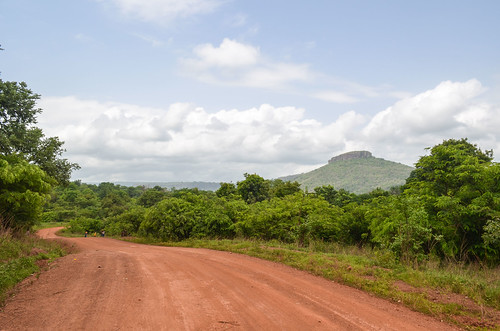
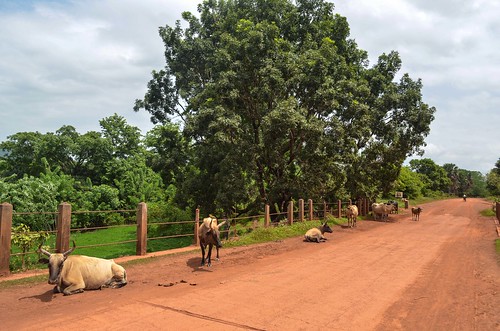
There are not many things to eat on the way. I skip the small shops in the village selling cigarettes, canned food, and a bit of anything. I skip also the water pumps since they are locked. It is often the case that one responsible in the village locks the pumps with a chain to avoid spillage, and sometimes to avoid the well to dry up.
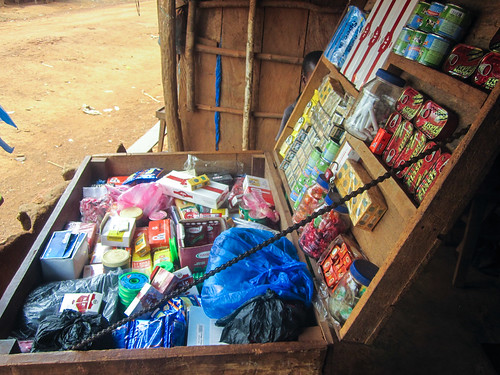

The market on Sundays is in the next village, 33 km further. That is a long time for riding dirt roads, but I don’t feel like stopping and cooking for myself.
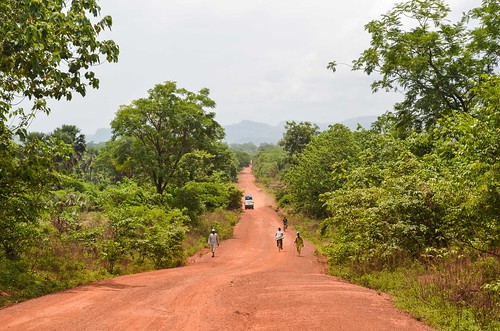
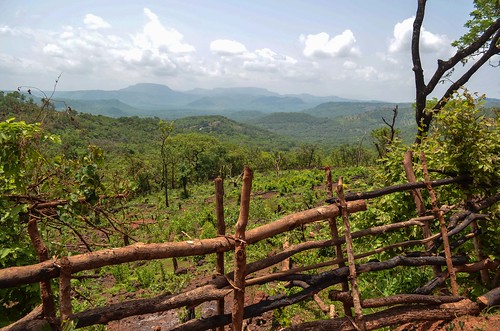
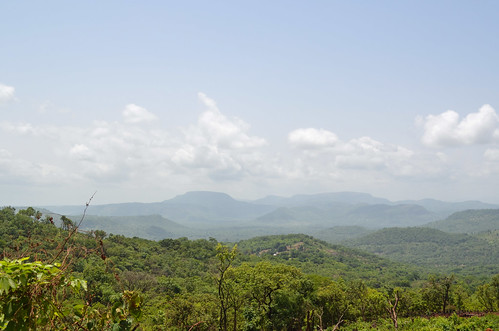
The road is not particularly steep. But the heat, the humidity, the small flies trying to get into my eyes, and the rough surface making it impossible to climb at a steady pace, are joint together creating a tough experience.
I have to push the bike at some times, when I realize that I am not going faster by riding it. When I decide to rest in shade of green foliage, at the end of an uphill slope, an overloaded Peugeot 505 parks close to me.
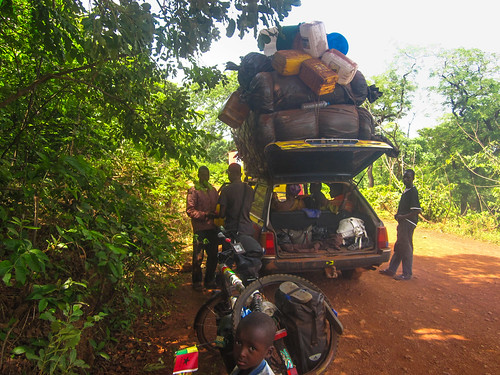
The driver refills the radiator with water. People get out of the car to walk a bit … they are 10 inside! The apprenti (the boy assisting the driver) tightens the luggage, which takes as much volume as the car itself, on the rooftop, while several women arrive walking. They had actually stepped down to let the car finish the climb, and now they are getting back inside. Which makes a total of 16 persons in this car ! (plus the boy standing outside, holding on to the luggage rack).
The people cannot believe there is a man cycling on those roads from Koundara to Labé (indeed, there seems to be no one else doing it). Likewise, I can’t believe so many people and luggage can fit into an old car, probably retrofitted and repaired after each trip. So the driver and I are both in a state of amazement/respect, until he tells me to stop riding and to jump in the car (“The bike can fit on top!“). I am sure they can do it, but I am incredibly more comfortable sweating in the heat and dust outside, than squeezed inside (with more heat and more dust).
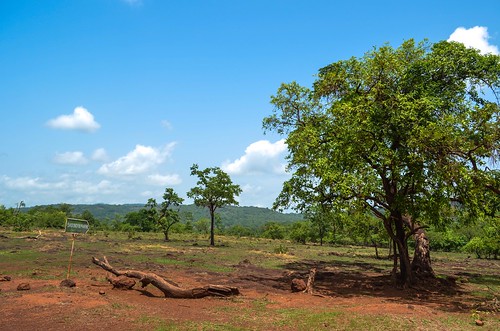
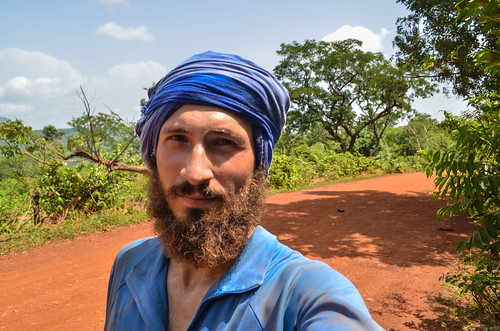
My upper body is itchy. I have small red dots appearing on my arms and on my belly. I don’t know where it comes from. For sure, my shirt being sweat-wet from morning to evening, collecting everything in the air, and never drying off at night, is not helping.
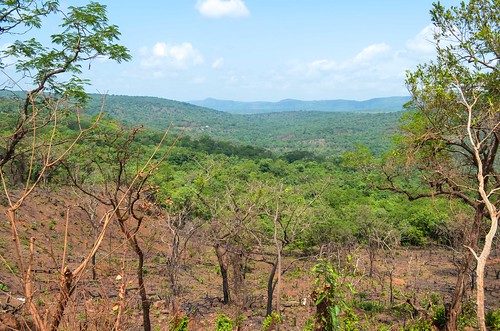
I am about to stop to make pasta as I feel dizzy and weak. I have not eaten yet since I waited to find road side food, which didn’t happen. But as I should reach the so called Sunday-market village, I push it a bit further. I know nobody gets the distances right and any sentence containing “in X kilometers” can be ignored, but I have hope this time.
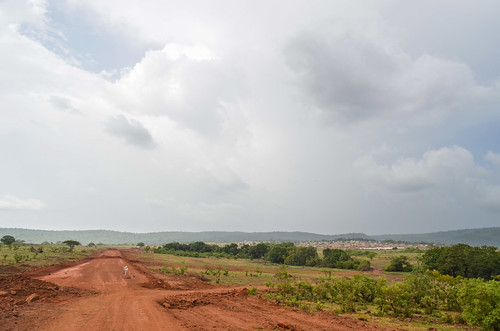
And just when I see a lightening and hear the thunder looking for me, Tiaguel Bori appears in front of me. It is not a village, but as big as a small town, and it relieves me to know that I will find food in the middle of the afternoon. This place is indicated nowhere, on no maps, paper or online, no signs, despite its size. Maybe the population grew rapidly. It’s also a base camp for the Chinese trucks and employees building the road link.
The sight of the town and the rain approaching help me find deep inside me the little energy I thought I had no more. I receive a few droplets while I’m racing with pain on the bumpy road for trucks and machines, and manage to shelter at a meat shop. It’s well done but the heavy rain doesn’t come: the drizzle and the black clouds are still roaming around in the sky, as if to taunt me.

When I ask people about the weather, wondering if the rain is coming soon, at night, big or little, etc, I get the same reply without exception.”God is great“. The answer “God is great” or “It’s God’s will” are very practical, I admit, but it’s very annoying to me that people avoid answering questions with this joker answer. It reminds me a bit of the Japanese 仕方がない. If the country is poor or if a baby dies from an easily curable disease, I expect any answer but not this helpless one.
The sky is blue, grey and black at the same time. The only positive thing in the weather is that it is much cooler than before. Finally the temperatures become pleasant to ride. With reason, I would stay in Tiaguel Bori and find a place to sleep, but I decide to see behind the hill what is happening with those clouds and why they don’t rain on me.
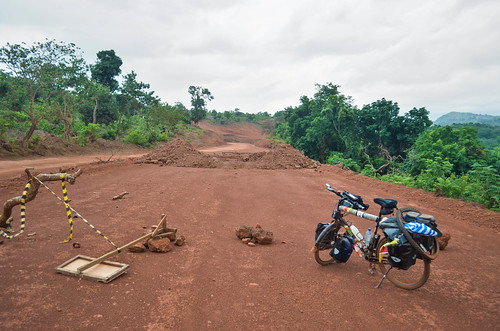
The road goes uphill again, this time over 800 m high. The black clouds are still roaming around, with little rain, and I am lucky to find a school on top of the hill. The schools seems to be the only public buildings where I could find a roof. The summer holidays last 4 months, hence the schools are empty, and can provide a good shelter against the rain if the roof is extending enough beyond the walls. But this school doesn’t offer shelter and the rain stops. I have no rain jacket and don’t want to end the day soaked, if possible … I continue further.
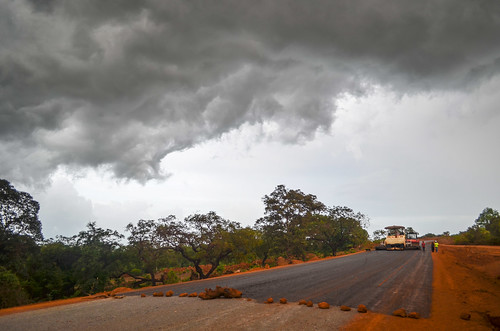
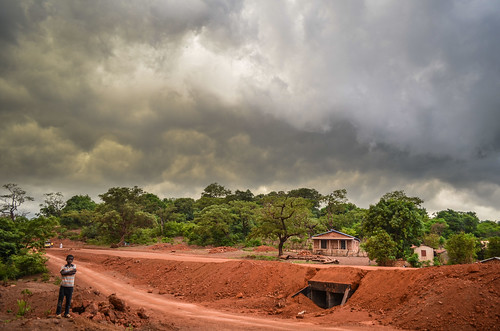
There is now a 4 km long paved section, as the Chinese have begun to pave it until Labé. A few kilometers further, I reach Lafou, and head for the school. I am strongly advised not to sleep there and to show up instead at the sous-préfecture, where there are apparently rooms for travelers. It is a bit surprising but I follow the indications of the man.
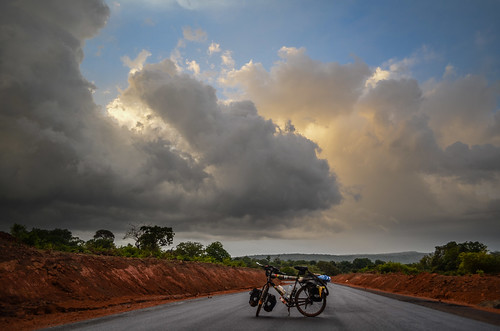
The sous-préfet, his deputy, and the mayor are out of town. It’s Sunday night and they have been in Labé for the week-end. Amadou, a land surveyor that has a temporary room at one of the sous-préfecture building, accompanies me to the house of the next person able to make decisions, the head of the health center. When I just wanted part of the ground under the roof, they agree to give me one room inside. One of the kids participates to my collection of “Give me XXX” that I hear on the road: “Your hair is beautiful, give it to me“.
The room is a kind and very helpful gift, since right after bucket-showering, the thunder and the lightnings surround us and the rain pours down heavily. The black clouds were not joking and I can stay dry and cook a cheap African specialty while the show of the unleashed elements unfolds in front of me. On the menu for tonight is the sandwich of spaghetti, of course with the omnipresent Maggi flavor cube and peanut oil. With my small cooking devices, I can feed two (including me) above satiety and have leftovers for the next morning. If it can’t be called gastronomic, it is at least efficient cooking.
I can count more than a lightning per second flashing in the sky during the rest of the evening. I realize also that it’s finally “cold” enough so that I can spend the night without sweating! And I made most of the road until Labé, including the worst parts, so this heavy rain falls right on time. There is a big difference between riding a dirt road just after the rains, and after 5 dry days.
For my last day on the Koudara-Labé route, I start with the end of the climb up to almost 1100 meters. There is a cool breeze and it’s much better this way! I can cycle uphill and not end up completely soaked in my own sweat. Plus, the wind is drying me quickly.
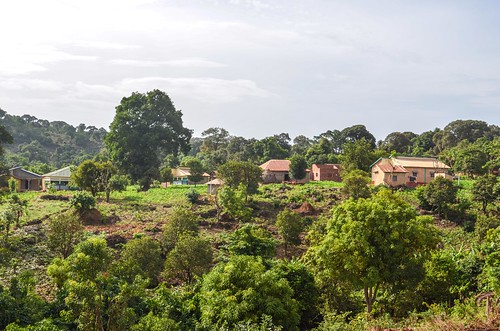
The road works on those 50 last kilometers to Labé are well advanced. The surface is flat and the workers are laying down the asphalt in some parts. There are relatively few Chinese bosses to manage the teams of Guineans. The machines are not Caterpillar or Komatsu, they are Shantui and Lui Gong.
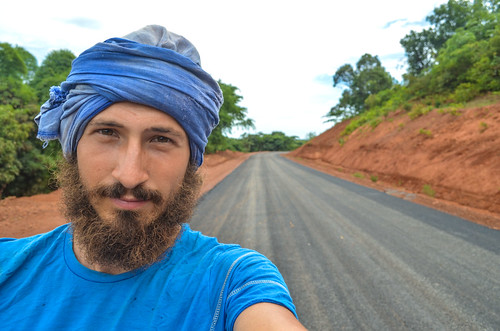
On Mondays, the market is in Kountoubhel. What should be a quiet village is today a huge mess. The road, not that wide, and in re-construction, bordered by houses and shops, must host trucks unloading goods, street vendors, women carrying everything on their head (it’s hard for them to see what is behind them as they cannot turn their head quickly), temporary street stalls, and all the people from the neighboring villages. It is better to step down and to walk the bike through.

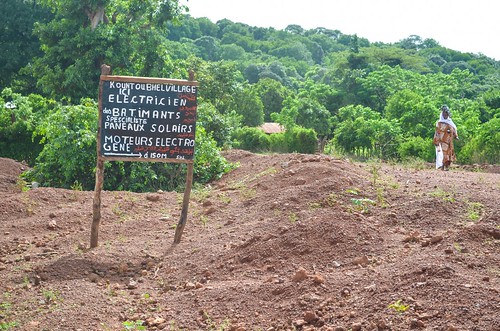
There are no bicycles on the road, apart from the kids playing around their villages. However, the motorcycles are plenty. They are all Meilun motorbikes. One of those bikes costs just 500 €. I have found no website or serious information for this brand on the internet, yet every taxi-boy here has one. The motorbikes are acting like taxis for short distances, their cost is just above the cost of the petrol needed for the ride.
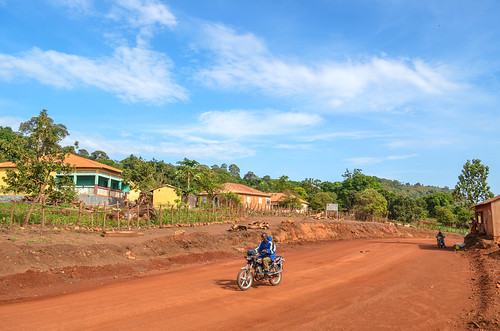
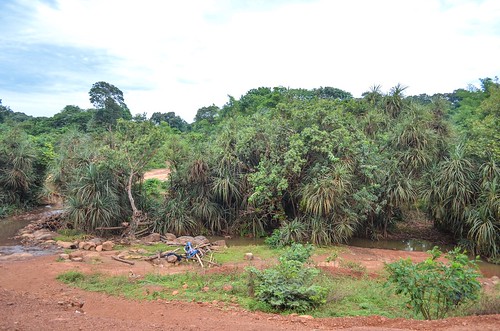
The road is paved on the last kilometers to Labé, the capital of Middle Guinea, at the center of the country, and second largest city of Guinea. It is the home of the Fula people, also called Peulh in other countries. To enter the city, I must pass by the abandoned airfield and a military barracks, and am happily surprised to see electric poles! I have no electricity since I left Senegal, it has been 9 days. And it’s time to charge my battery packs, as those bad roads and slow speeds didn’t allow me to charge it with the dynamo.

My first stop is at the Direction Regionale de l’immigration. I still have to rectify my single entry visa into a double entry, which I couldn’t do in Bissau. It is not compulsory, but that would allow me to re-enter Guinea from Liberia if needed later, instead of getting another 100 USD visa. The big boss of Home Affairs is here and when he sees me, he takes me directly into his office. That sounds promising.
His ice breaker joke is “So you’re French? You don’t come back to colonize us this time?“. I am sometimes taken as responsible for the colonial past of France. It can vary from a friendly (and likely not without ulterior motives) “You are at home here” to a “You abandoned us!“. Many Guineans feel resentful to France for not having accompanied them in the first post-colonial years. The economic situation today is one of the worst of all West Africa, which is a poor result knowing that peace prevailed since the independence in 1958, an achievement that few countries in the region share. On the other hand, Guinea and Sékou Touré asked and obtained the independence two years before the other French colonies in West Africa, as they were the only territory among the 14 French colonies to refuse the West African community project by referendum. As a result, Guinea got instantly disconnected with France, a decision that a teacher stated to me as wrong, because it explains why Guinea is doing much worse than Senegal and Ivory Coast.
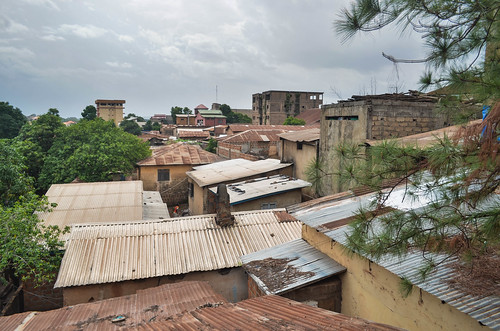
Despite the current economic situation, and the impression that almost every Guinean wants to leave the country, it’s not uncommon to hear sentences like “We are rich” and “We are the richest of Africa“. When looking at Guinea’s resources, the 10 M population should be indeed living much better than all of its neighbors. The “water tower of West Africa” has a very fertile climate and basically, anything grows here. Yet, there is no water in the taps. The mountains of the Fouta Djalon and the many rivers offer the greatest hydroelectric potential of the region. Yet, there is no electricity and Guinea depends on petrol importations. The country holds up to, according to various sources, a quarter to two thirds of the world’s total reserves of bauxite, significant diamond and gold deposits, and is said to hide the world’s largest unexploited iron ore reserves. There is no doubt, Guinea is a rich country, as certainly as the people are poor. Yet, important road links have remained unpaved for 50 years after independence until today, and most of the people I talked to are ready to leave and to do any kind of job in France.
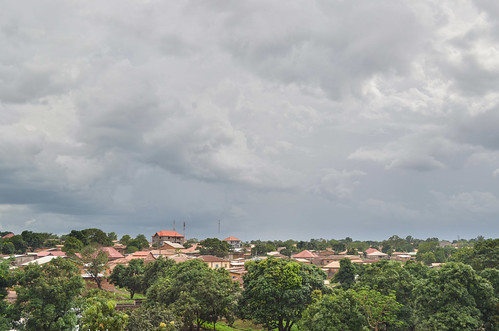
So here I am, sitting in the big boss’ office with a delegation of less important people in my back. I explain my issue and the big boss tries calling Conakry to get a proper answer. He cannot do any modification on my visa, but says that it “should” be valid with as many entries as I want until the expiry date, even if it mentions “single entry”. Conakry doesn’t pick up the phone so I am left with yet another “advice” on how “should” my visa work.
It is not a successful visit, however, he doesn’t let me go away without offering a dish that women are preparing in front of the regional home affairs compound. I end up eating toh, a spicy cassava soup with gooey bits, quite good for 0,20 € the plate, in the immigration bureau. I forget about the visa issue, now convinced that no one wants or is able to deal with it.

About the economic situation, “it can only improve”, was I thinking, until deep discussions about the ethnic groups in Guinea. The Peulhs/Fula are scattered all over West Africa, where they are a minority in each countries they live in. Guinea is the only country where they are a majority (40%), ahead of the Malinké (30%), the Susu (20%) and other people in the Guinée Forestière (who could be referred as “the ones who eat monkey” …). The Fula are historically peaceful people, mostly traders. Since 2010, the current government is headed by a Malinké president who appointed too many Malinké at important positions. It resulted in the situation today where the all the powers (judicial, army, police, etc) are in the hands of a minority, who abuse them to segregate the Peul majority that controls the businesses. The civil war ingredients are in place with seemingly little awareness from the international scene.
I check in the nearby hotel, which offers buckets of rain water in a bathroom where nothing works, and no other electricity than the public one. The public electricity works intermittently. People know that it never works one full day. And if there is no power during a full day, it will be on the next night. Some people somewhere decide when the city of Labé can receive electricity, and everybody have to accept it (or pay a lot for private generators). It is apparently the same for Conakry, the capital city has no reliable electricity.
My forearms show a reddish brown color, proving that short sleeves got me burnt even in the relative cold and under the clouds. Unless it is the red dust from the dirt tracks? About the cold, I find funny to see people wearing winter jackets, with fur and hats. It is below 30°C, maybe even below 20°C at night. It is hence maybe the coldest place in West Africa, but still very suited for short sleeves.
In the market of Labé, quite pleasant and interesting to take a stroll in, I find bicycle gloves to replace my lost one, a sticker of the Guinea flag for my bike, and surprise, a sticker of the French flag, that I couldn’t find in France (“You must check in petrol stations on the highways“, I was told). The next day, the market closes symbolically to protest against the aggression of the main political opponent of Alpha Condé.
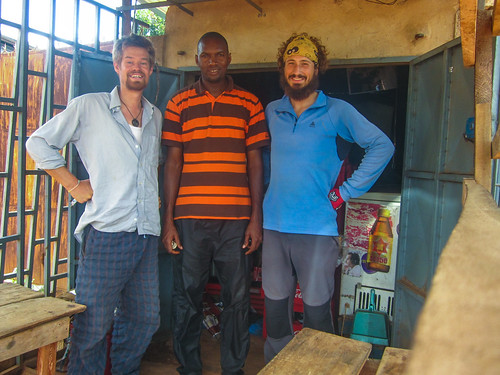
The electricity in my hotel room is quite scarce. When it is on, the lamp bulb is flickering badly and I fear from my laptop and electrical appliances charging; it’s not uncommon to blow up something with a very unstable power supply. The only internet in town is at the cybercafé nearby, but it is not working for the two days I stay in Labé. “When the rain falls, often the connection doesn’t work“. I have thus no reason to stay longer in town, but I am lucky to be in a dry place during the rain and especially to bump into Maimouna at Hassan’s headquarters. She appears to be hosting Sébastien, a Belgium cyclist still recovering from malaria and a knee injury. We have good times together, including an epic crêpes party with a curved bottom oversized pot over charcoal.





Lafouuuu! My third project was in Lafou. I left some comments on flickr with links but my pictures from Lafou are here: https://flickr.com/photos/commissariat/albums/72157679682018100 Sadly it didn’t look like I had any recognizably similar to yours. Oh hey the bar I had commented looked like one I’d seen, the bar I was thinking was just 100m or so up the road from where your Lafou picture was taken.
Thanks for your comments Kris!
Glad to know you’ve been developing projects there too. Hope the roads are getting better …
L’ami cyclo!
Content de lire que tu poursuis ces aventures africaines avec le karma toujours aussi bien encré il me semble!
Après avoir passé encore quelques temps dans mon village de brousse ou j’avais laissé le vélo puis à Labé avec la bande, pour quelques escapades entre cascades guinéennes j’ai poursuivi vers la haute guinée puis vers le Mali. Intéressant de vivre le ramadan puis les élections dans le pays. Je suis remonté le long du delta du Niger jusque dans les falaises du Bandiagara pour laisser le vélo pour la marche dans ces villages animistes-musulmans-chrétiens, aussi paisibles que reculés:)
Il était ensuite temps pour moi de refaire un tour en Belgique pour profiter de la fin des beaux jours et revivre avec les miens. J’ai pris un vol à Bamako… rentré il y a 2 semaines, pas tous les jours facile la réaclimatation. Et j’envisage la reprise de la vie active pour renflouer le porte monnaie épuisé, à sec malgré le coup de la vie idyllique africaine.
Merci pour cette replonge dans le monde africain après quelques lectures de ton magnifique blog!
Bonne chance pour la suite cowboy
et à bientôt pour de nouvelles aventures, inch allah 😉
Seb
Je me disais que peut-etre on va se recroiser vers le ghana ou bénin …du coup tu es resté dans le inch’allah sans gouter aux godblessyou’s, mais t’a dois avoir la tete bien pleine de souvenirs et de connaissances.
Bon courage pour la vie sédentaire et pour le job hunting!
Moi je continue vers l’est, depuis Accra maintenant.